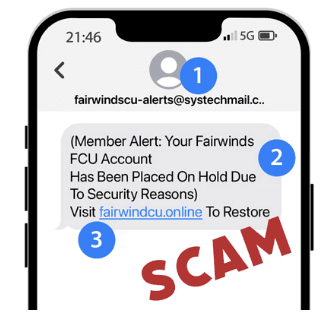Fraud Center
Protecting you and your account information is always our top priority.

How We Protect You

Multi-factor Authentication
We’ll send a text message or email verification when you sign into your account on a new device. You’ll receive a one-time code needed to sign in. We will NEVER ask you for this code and do not share with anyone.

Fraud Alerts
Receive fraud alerts through text message, email, or phone for your FAIRWINDS Visa® Debit or Credit Card. Simply reply to the message to confirm or deny suspicious transactions, all from the convenience of your phone.

Lock and Unlock Your Card
You can easily lock and unlock your debit and credit card instantly if it’s lost or stolen all through Card Management in the FAIRWINDS mobile app.

Real-Time Account Alerts
Sign up for alerts through FAIRWNDS Online or our mobile app to receive text or email updates on important account activities like your daily balances, debit card transactions, low balances, and more.
Tips to Secure Your Accounts
Ensure your Online Banking password is unique and not used for any other accounts.
Change the password to your email account. Email access is often a key step in account recovery processes and should be secured.
Update passwords for other important platforms (such as shopping sites, streaming services, and mobile apps), especially if you reuse passwords across sites.
When updating your passwords, be sure to choose strong, unique combinations for each account and avoid reusing old passwords.
Be Alert
FAIRWINDS will never reach out to you and ask for you to provide information related to your online banking credentials like username, password, or a multi-factor authentication code.
If you receive a suspicious text message, phone call, or email, contact FAIRWINDS' official phone number at (800) 443-6887 to validate or report the communication you received.

Red Flags to Look Out For
If you receive an unexpected communication claiming to be from FAIRWINDS, here are tips to help you stay vigilant against fraud:
If you receive an unsolicited call or communication from FAIRWINDS asking you to provide sensitive account information, do not respond.
Fraudsters often try to create a sense of urgency or use scare tactics to get you to react quickly, including providing your personal or account information. For example, the communication might say that your account will be closed or that your information has been compromised. Do not respond or click any link provided.
Look for misspellings and usage of incorrect grammar.
Do not click on any links and do not call the phone number provided in an unexpected communication.
Do not open attachments or download files that are included in an unexpected communication.
This is an example of a recent fraudulent text message
1. Suspicious sender
2. Scare tactic
3. Spelling errors

This is an example of a recent fraudulent text message
1. Suspicious sender
2. Scare tactic
3. Spelling errors
How to Report Fraud
Want to learn more about imposter scams?
Visit the Federal Trade Commission's Consumer Advice for more information about current imposter scams and how you can protect yourself.
Featured Articles

In 2023, the FTC reported over 64,000 people fell for a romance scam. But what exactly is a romance scam, and how can you avoid becoming a victim?

Empower your identity protection journey: Safeguard personal info, stay vigilant, and secure your digital life. Your essential guide to worry-free living.
